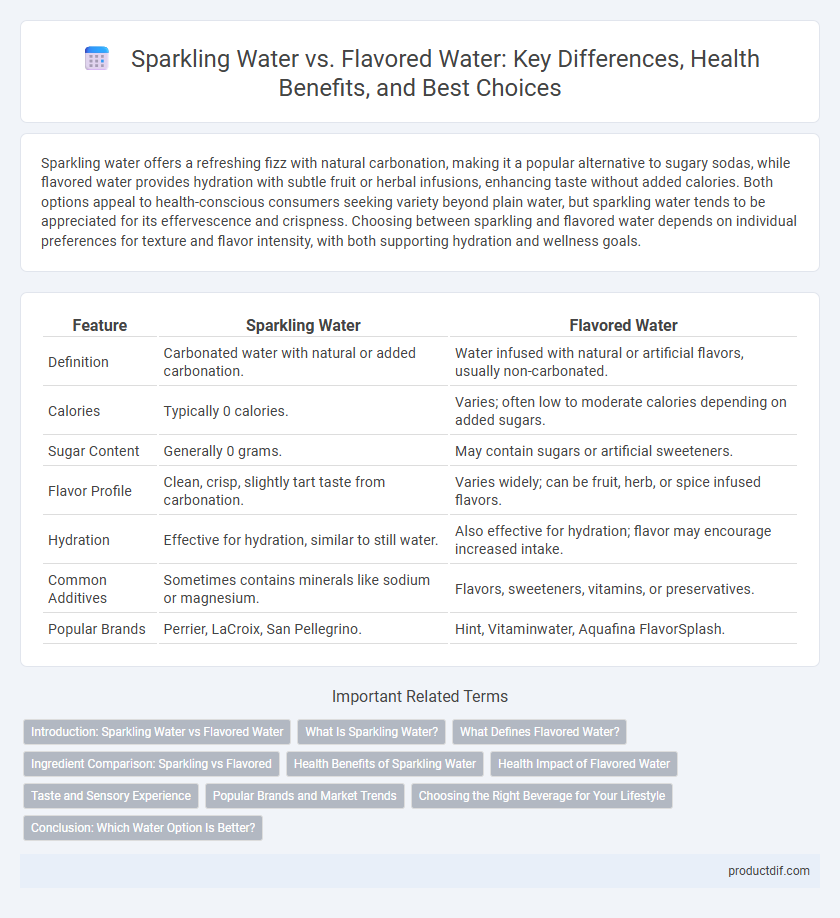Sparkling water offers a refreshing fizz with natural carbonation, making it a popular alternative to sugary sodas, while flavored water provides hydration with subtle fruit or herbal infusions, enhancing taste without added calories. Both options appeal to health-conscious consumers seeking variety beyond plain water, but sparkling water tends to be appreciated for its effervescence and crispness. Choosing between sparkling and flavored water depends on individual preferences for texture and flavor intensity, with both supporting hydration and wellness goals.
Table of Comparison
| Feature | Sparkling Water | Flavored Water |
|---|---|---|
| Definition | Carbonated water with natural or added carbonation. | Water infused with natural or artificial flavors, usually non-carbonated. |
| Calories | Typically 0 calories. | Varies; often low to moderate calories depending on added sugars. |
| Sugar Content | Generally 0 grams. | May contain sugars or artificial sweeteners. |
| Flavor Profile | Clean, crisp, slightly tart taste from carbonation. | Varies widely; can be fruit, herb, or spice infused flavors. |
| Hydration | Effective for hydration, similar to still water. | Also effective for hydration; flavor may encourage increased intake. |
| Common Additives | Sometimes contains minerals like sodium or magnesium. | Flavors, sweeteners, vitamins, or preservatives. |
| Popular Brands | Perrier, LaCroix, San Pellegrino. | Hint, Vitaminwater, Aquafina FlavorSplash. |
Introduction: Sparkling Water vs Flavored Water
Sparkling water contains carbon dioxide gas, creating a fizzy texture without added sugars or flavors, making it a calorie-free alternative to soda. Flavored water typically includes natural or artificial flavors and sometimes sweeteners, catering to those seeking taste variety with fewer calories than sugary drinks. Both options offer hydrating benefits but serve different preferences in taste and texture within the beverage market.
What Is Sparkling Water?
Sparkling water is carbonated water infused with carbon dioxide gas under pressure, creating its characteristic effervescence without added sugars or calories. It often contains natural minerals like sodium, potassium, and magnesium, enhancing its taste and providing slight alkalinity. Unlike flavored water, sparkling water maintains a crisp, clean profile, making it a popular zero-calorie alternative to sugary soft drinks.
What Defines Flavored Water?
Flavored water is defined by the infusion of natural or artificial flavors into still or sparkling water, enhancing taste without significantly increasing calories or sugars. It often contains added vitamins, minerals, or sweeteners, differentiating it from plain sparkling water, which is simply carbonated water without flavor additives. The variety of flavor profiles and functional ingredients makes flavored water a popular choice for consumers seeking hydration with a taste boost.
Ingredient Comparison: Sparkling vs Flavored
Sparkling water contains carbonated water with natural minerals or added carbonation, offering a crisp and refreshing taste without sugars or artificial additives. Flavored water often includes natural or artificial flavorings, sweeteners, vitamins, and sometimes preservatives, making it higher in calories and additives compared to pure sparkling water. Choosing between sparkling and flavored water depends on preferences for taste, calorie intake, and ingredient purity.
Health Benefits of Sparkling Water
Sparkling water offers hydration benefits similar to plain water while providing a fizzy texture without added sugars or artificial ingredients, making it a healthier alternative to many flavored waters that often contain sweeteners. It supports digestion by promoting a feeling of fullness and can aid in reducing calorie intake when substituted for sugary beverages. Unlike some flavored waters, sparkling water typically contains no calories or additives, preserving its natural hydrating properties and contributing to better overall health.
Health Impact of Flavored Water
Flavored water often contains added sugars, artificial sweeteners, and preservatives, which can contribute to increased calorie intake and potential metabolic issues compared to sparkling water. While sparkling water is typically free of calories and additives, flavored water's health impact depends on its ingredients, with natural flavorings posing less risk than synthetic ones. Consumers concerned about hydration benefits and calorie consumption should carefully examine the ingredient list of flavored water products.
Taste and Sensory Experience
Sparkling water offers a crisp, effervescent taste with a tingling sensation that enhances the drinking experience, making it feel refreshing and invigorating. Flavored water provides a variety of subtle, natural or artificial tastes without carbonation, catering to those who prefer smooth, mild flavor profiles. The sensory contrast between the lively bubbles of sparkling water and the gentle sweetness in flavored water appeals to different preferences in hydration and taste enjoyment.
Popular Brands and Market Trends
Sparkling water brands like LaCroix, Perrier, and Bubly dominate the beverage market with their wide range of naturally carbonated options, appealing to health-conscious consumers seeking sugar-free hydration. Flavored water brands such as Hint, Aquafina FlavorSplash, and Nestle Splash leverage natural fruit essences and minimal calories, driving growth in the flavored water segment amid rising demand for functional beverages. Market trends indicate increasing consumer preference for clean-label ingredients and innovative packaging, pushing both sparkling and flavored water brands to expand their product portfolios and invest in sustainable sourcing.
Choosing the Right Beverage for Your Lifestyle
Sparkling water offers a crisp, fizzy alternative to plain hydration, often containing natural minerals that support digestion and refreshment without added sugars. Flavored water typically includes natural or artificial flavorings, which can enhance taste but may involve sweeteners or calories, making it less ideal for strict low-calorie diets. Selecting the right beverage depends on your health goals, dietary restrictions, and preference for carbonation or flavor intensity.
Conclusion: Which Water Option Is Better?
Sparkling water offers a refreshing, fizzy experience with natural minerals that support hydration, while flavored water provides a taste variety often infused with vitamins and antioxidants for added health benefits. Choosing between them depends on personal preference and nutritional goals, with sparkling water excelling in pure hydration and flavored water standing out for enhanced flavor and functional ingredients. For optimal health, selecting options with minimal added sugars and artificial additives ensures maximum benefits regardless of type.
Sparkling Water vs Flavored Water Infographic

 productdif.com
productdif.com